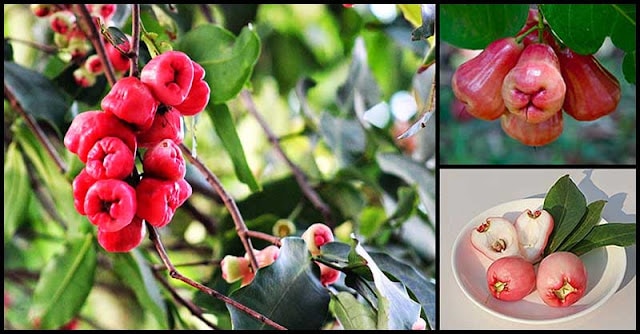Makopa is a tree that is native to Southeast Asian countries. It has a sweet and sour taste that refreshes us and is very nutritious. Makopa has many names, depending on which country one finds oneself. Some of its common names are rose apple, wax apple, and Jambu. Here are the numerous health benefits we can obtain from makopa tree.
Helps Improve Digestion
Makopa is rich in fiber. Fiber aids in digestion by properly regulating the food passage and also healing diarrhea, constipation, dysentery, and other serious health conditions. Dietary fiber is also good for regulating blood sugar and helps in weight management.
Also, in traditional medicine, the seeds of makopa have been used to prevent diarrhea and dysentery.
Helps Improve Heart Health
Makopa is high in potassium, water, and other plant compounds that have positive effects on lowering blood pressure and protecting heart health which in turn, lowers our risk of cardiovascular diseases like strokes, heart attacks, and coronary heart diseases.
Rich in Vitamin C
A 100-gram portion of makopa contains 22.3 micrograms of Vitamin C (as per USDA data).
The fruits are rich in vitamin C, an antioxidant that can help boost our immunity to counteract the colds and is beneficial in the formation of collagen for keeping the skin your looking.
Moreover, vitamin C also helps prevent the damage of free radicals, toxic chemicals, and pollutants which leads to health ailments such as heart disease, cancer, and arthritis. It also enhances the white blood cells production and also assists in the functioning.
Rich in Calcium
Makopa fruit contains calcium, the most important nutrient for bones and teeth. A 100 gram of makopa contains 29 micrograms of calcium (as per USDA data).
Helps Prevent Acne
The leaves of makopa possess anti-acne properties such as anti-inflammatory, antioxidant, and antibacterial properties which is helpful in people suffering from acne vulgaris, a medical name for common acne — the presence of blackheads, whiteheads, and other types of pimples on the skin.
Moreover, the decoction of the leaves also acts as an expectorant and diuretic which treats rheumatism and also helps treat sore eyes.
Helps In Reducing Toxicity In The Body
The decoctions coming from the fruit are useful as diuretic substances. This is beneficial in clearing out the toxicity of the kidney and the liver as well as in improving the health and metabolic efficiency of the body.
Other Traditional Uses
- Fruit peel strengthens the spleen, warms the stomach, and helps treat tumors and deep ulcers.
- The bark is used to treat asthma, hoarseness, and bronchitis
- In the Chinese system of traditional medicine, its root bark and fruit are used as a blood coolant.
- Flowers have antipyretic effects and seeds treat dysentery, diarrhea, and cataract.









